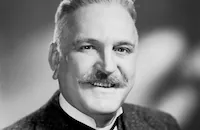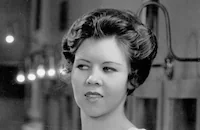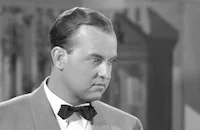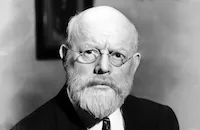Casanova Brown

Brief Synopsis
Cast & Crew
Sam Wood
Gary Cooper
Teresa Wright
Frank Morgan
Anita Louise
Edmond Breon
Film Details
Technical Specs

Synopsis
When Casanova "Cas" Q. Brown is greeted at the Rossmore, Illinois train station by Madge Ferris, he begs her never to let him out of her sight and never to mention New York. Several months later, Cas asks Madge's cantankerous father, J. J. Ferris, for permission to marry his daughter. Incredulous that anyone could love Madge, J. J. assumes that Cas is marrying her for her money and refuses permission on the grounds that he wants to spare Cas the fate that he has suffered. Cas and Madge decide to marry over her father's objections, and on the day of the wedding rehearsal, Cas receives a letter from a maternity hospital in Chicago, asking him to contact Dr. Martha Zernerke. Hastily excusing himself from the rehearsal, Cas confides to J. J. about his misadventure in New York: In a whirlwind romance, Cas meets and marries Isabel Drury. When Isabel brings her new husband home to meet her parents, her eccentric mother insists on consulting the stars about their matrimonial future. After Mrs. Drury proclaims that the position of the stars portends disaster, Cas offends his mother-in-law by opining that astrology is nonsensical. The relationship between Cas and his in-laws takes a turn for the worse when he burns down the Drury mansion with a discarded cigarette that he was trying to hide from Mrs. Drury. When Mrs. Drury declares the fire to be an astral warning, Cas, exasperated, storms off, leaving behind a sobbing Isabel and an annuled marriage. Upon concluding his story, Cas tells J. J. that he has decided to go to Chicago to investigate the letter, but plans to return that night in time to marry Madge. At the hospital, Cas meets Dr. Zernerke, who, after showing him his baby daughter, informs him that Isabel has decided to put the infant up for adoption. When Cas confronts Isabel about the adoption, he admits that he still loves her, but she reproaches him for not writing and reminds him of his impending marriage. To prevent losing his daughter, Cas poses as a doctor and kidnaps the baby. As Cas exits the hospital with his daughter, Isabel tells Dr. Zernerke that the adoption was just a ruse to test Cas's intentions and that she now wants to reconcile with him. Meanwhile, back in Rossmore, Madge, dressed in her bridal finery, is awaiting her groom when Cas calls J. J. to inform him about the baby. Calmly turning to his wife and daughter, J. J. announces that Cas cannot make the wedding and suggests going to a movie instead. Cas takes the baby to his hotel room where, aided by Monica, the maid, and Frank, the bell captain, he strives to perfect a baby formula. Cas's daily bulletins about the baby's health do nothing to mollify Isabel, however. When Frank, wearing his hotel uniform, visits the hospital in search of the perfect formula, Cas fears that the staff will trace the baby to the hotel and decides that he must marry immediately if he hopes to retain custody of his child. After he proposes to Monica, the female in closest proximity, the two rush to the marriage bureau. Meanwhile, Madge and her father and Isabel and her father arrive at Cas's hotel room, and Frank informs them that Cas has gone to City Hall to be married. Upon his return, Cas, alerted by Frank about his visitors, hides with the baby in a different room. While sobbing over her loss of Cas in the hotel hallway, Isabel hears her baby cry. Following the sound of the cries to Cas's room, Isabel enters to find Cas feeding their daughter. When Isabel admits that the adoption was a ruse to win Cas back, he tells her that he was prevented from marrying Monica by the state's requirement of a three-day waiting period. After the baby burps, Cas and Isabel reconcile, and Cas promises to teach her how to take care of their baby.

Director

Sam Wood
Cast

Gary Cooper

Teresa Wright

Frank Morgan

Anita Louise
Edmond Breon

Patricia Collinge
Jill Esmond

Mary Treen
Emory Parnell

Isobel Elsom

Halliwell Hobbes
Charles Cane
Larry Joe Olsen

Irving Bacon

Dorothy Tree
Robert Emmett Keane
Cecil Stewart
Helen St. Rayner
Stewart Garner
Barbara Ader
Virginia Wave
Mary Moore

Byron Foulger
Walter Tetley
Sarah Padden
Mary Young
Eloise Hardt

Grady Sutton
Frederick Burton
Robert Dudley
Isabel Lamal
Charles Sherlock
Dorothy Vaughn
Alex Pollard
Gerald Oliver Smith
Hilda Plowright
Pietro Sosso
John Brown
Mary Currier
Florence Lake
Ann Evers
Frances Morris
Nell Craig
Anne O'neal
Claire Dubrey
Charles Latorre
Ernie Adams
Mike Lally
Buddy Wilkerson

Howard Mitchell
James Harrison Sr.
Buck Harrington
Billy Bletcher
Jack Gargan
Lane Chandler
Harry Tyler
Kay Deslys
Ottola Nesmith
Lynton Brent

Roy Gordon

Emmett Vogan
Lorna Dunn
Kelly Flint
Julia Faye
Sam Ash
Tom Quinn
Gladden James
Isabel Withers
Edward Earle
George Carleton
George Anderson
Jack Clifford
Dick Rich
Hector Sarno
Harry Semels
Lelah Tyler

James Burke
Francis Sayles
Phil Tead
Snub Pollard
Jack Gardner
Morgan Brown
Ralph Linn
Bob Thom
Stanley Price
Ted Stanhope
Donald Kerr
Dell Henderson
William Jamison
Milton Kibbee
Lane Watson
Grace Cunard
Verna Kornman
Ann Luther
Marion Gray
Sada Simmons
Ezelle Poule
Wilda George
Bryn Davis
Robert Cherry
Ernie Alexander
Frank Mills
Pamela Jane Akin
William Chafin
Marshall Jaffeson
Crew
Edward Churchill
Perry Ferguson
Julia Heron
Arthur Johns
Nunnally Johnson
Nunnally Johnson
Nunnally Johnson
Muriel King
Arthur Lange
C. Ken Lobben
Thomas Neff
John Seitz
John Sherwood
Joe St. Armand
Ben Winkler

Film Details
Technical Specs

Award Nominations
Best Art Direction
Best Music, Original or Comedy Series
Best Sound
Articles
Casanova Brown
In this slight comedy with a charming cast, Cooper plays the title character, an unassuming young man who is about to marry Madge Ferris (Anita Louise). On the day of his wedding rehearsal, he receives a letter from a maternity hospital in Chicago informing him that he is the father of a baby daughter. Months earlier, Casanova (called Cass) had enjoyed a whirlwind romance with Isabel Drury (Teresa Wright), and the young couple married in haste. But, the Drurys turned out to be an eccentric family, and Cass didn't fit in. The relationship between Cass and his in-laws deteriorated further when he accidentally burned down the Drury mansion, resulting in the annulment of his marriage. But, given the birth of a daughter, there was much more to the marriage than a piece of paper.
Cass returns to Chicago to confront Isabel and discovers that she is about to put up the baby for adoption. He kidnaps his child and takes her to his hotel room where a maid named Monica and a bell captain called Frank help him care for the infant. Cass proposes to Monica to strengthen his parental rights, but Madge, her father, and Isabel descend on the hotel to stake their own claims. When Isabel confesses that she used the threat of adoption to win back Cass, the young parents reconcile.
After starring in three serious films, The Pride of the Yankees (1942), For Whom the Bell Tolls (1943), and The Story of Dr. Wassell, Cooper enjoyed returning to comedy. His star image as the strong, silent man of action and integrity worked differently in comedy, where he tended to be shy and humble or a bit bumbling and naïve on top of his all-American persona. The scenes with the baby relied on the gentle, bumbling side of Cooper's image as the inexperienced Casanova Brown tries his hand at diapering, feeding, and taking care of his newborn daughter. But, the character is dependent on Cooper's trademark integrity, too. On the page, Casanova's abandonment of his first wife, his kidnapping of his daughter, and his willingness to leave his fiancée at the altar represent questionable behavior for a protagonist, but Cooper's trademark integrity helps viewers understand that Cass believes he's doing everything for the right reasons.
Scriptwriter Nunnally Johnson penned Casanova Brown especially for Cooper and tailored the material to suit his star image. Johnson adapted the script from a play titled The Little Accident, which he had seen on Broadway during the 1920s. Actor Thomas Mitchell co-wrote the play with Floyd Dell, who had written the book An Unmarried Father on which the comedy was based. In the novel and play, the main characters were not married, so the baby was illegitimate as indicated by the original titles; however, Hollywood's Motion Picture Production Code would not have approved of that detail in a movie during the Golden Age. The play had been turned into a film once before during the pre-Code era, with Douglas Fairbanks, Jr. as the main character, and there were other versions that wandered afar of the original story. But, the Production Code carried its unique set of limitations, so Johnson reworked the initial situation so that the young couple was legally wed. Despite the softening of the material, the dialogue and innocent nature of the characters helped the story retain an air of scandal.
Casanova Brown represented more than just a comedy vehicle for Cooper, however, it was also the first film from International Pictures, an independent production company formed in January 1944. William Goetz, a former producer at Twentieth Century Fox, served as president of International, with Leo Spitz, the former president of RKO, working the distribution. Johnson was brought in to handle the day-to-day production and to write the first couple of scripts. Cooper, International's largest stock holder at the time, was given a say in creative decisions. A production company and not a studio, International did not own equipment or a sound stage. Instead, they rented equipment and space in order to keep their company small and manageable. At this time, independent production companies were few in number in Hollywood, which was still dominated by the five major studios and three minor ones. However, within just a few years, the Supreme Court's Paramount Decree would break up the oligopoly that the eight largest studios had over the industry, and dozens of small production companies would pop up in the wake. International was a few years ahead of the pack.
Goetz, Spitz, and Johnson planned to make two films per year, with Spitz managing the distribution through a deal with RKO. Cooper's major contribution to Casanova Brown was to bring in his friend Sam Wood to direct. Wood was a studio veteran who had worked in the film industry since 1906 when one of his properties was rented by a movie company to shoot a one-reeler. He began directing in 1919 and earned a reputation as an efficient director who moved the plots of his films along at a fast clip to give them vitality, even when the material was slight. Wood was enjoying his greatest critical success in the early 1940s, having directed Goodbye, Mr. Chips (1939), Kitty Foyle, (1940), The Devil and Miss Jones (1941), Kings Row (1942), and The Pride of the Yankees in a three-year period. Cooper and Wood hit it off during the production of The Pride of the Yankees, and the pair reteamed to make For Whom the Bell Tolls and Saratoga Trunk (1945) in addition to Casanova Brown. The archly conservative Wood, who was outspoken about his anti-communist opinions, died unexpectedly of a massive heart attack in 1949. Whether due to his "style less" directorial style or his conservative views, he has never been fully appreciated by critics or scholars for his ability to bring out the entertainment value in even the slightest of material.
Cooper also had cast approval on Casanova Brown and was particularly pleased to lure Teresa Wright from the Samuel Goldwyn Studio to play Isabel Drury. Though Casanova Brown was only her fifth film, Wright had garnered much critical acclaim for her debut performance in The Little Foxes (1941), for which she was Oscar®-nominated as Best Supporting Actress. The following year she was a double nominee, as Best Actress for The Pride of the Yankees and Best Supporting Actress for Mrs. Miniver (1942). She won the Oscar® for the latter. Wright and Cooper had costarred in The Pride of the Yankees, and the no-nonsense actor was eager to reteam with the serious actress, who eschewed the Hollywood scene to concentrate on her acting.
Though Casanova Brown made some money at the box office and snagged three Oscar® nominations (art direction, sound recording, and scoring), it received mixed reviews and was a disappointment to Goetz, Spitz, Johnson, and Cooper. Undaunted, the group moved on to International's second film, a western comedy called Along Came Jones (1945). Johnson again tailored the script to Cooper's image, this time spoofing his persona as the laconic cowboy hero who is long on action but short on words. This time, Cooper served as the film's official producer. He thought he was well suited to the role of producer because he knew how to cut corners and pare down on waste, which he believed was rampant in the productions of the major studios. Cooper's admiration for Sam Wood was probably founded on the veteran director's ability to bring a movie in on time and on budget, though Stuart Heisler ended up directing Along Came Jones. The production of Along Came Jones not only proved to be a model of economy it was also the most financially successful of International's brief history.
Between his experiences on Casanova Brown and Along Came Jones, Cooper discovered he disliked producing. When crew members came to him with details or questions about the minutiae of film production, such as the appropriateness of a dress for a certain character, he became annoyed. He never produced another film, and he returned to starring in films for the major studios, severing his connection to International Pictures. International produced about 12 films with decent production values over the next few years before merging with Universal in 1946.
At the time, Casanova Brown was more famous for another distinction unrelated to its role in International Pictures and the rise of independent production companies. The film premiered overseas on August 8, 1944, in 16 locations along the Normandy front, so that U.S. servicemen could be the first to watch it. The premiere marked the first celebration held on the soil of liberated France. Before making the film, Cooper had visited U.S. soldiers in the camps and outposts along several fronts and was moved by their bravery and ability to endure harsh conditions. Cooper realized that even in peace time, the men who were soldiers probably could never have visited Hollywood for a real premiere, so he brought the premiere to them.
Producer: Nunnally Johnson
Director: Sam Wood
Screenplay: Nunnally Johnson, based on the play The Little Accident by Thomas Mitchell and Floyd Dell and the novel An Unmarried Father by Dell
Cinematography: John Seitz
Editor: Thomas Neff
Art Director: Perry Ferguson
Music: Arthur Lange
Cast: Casanova Q. Brown (Gary Cooper), Isabel Drury (Teresa Wright), Mr. Ferris (Frank Morgan), Madge Ferris (Anita Louise), Mrs. Drury (Patricia Collinge), Mr. Drury (Edmund Breon), Dr. Zernerke (Jill Esmond), Monica (Mary Treen), Mrs. Ferris (Isobel Elsom), Butler (Halliwell Hobbes).
B&W-91m.
by Susan Doll

Casanova Brown
Teresa Wright (1918-2005)
She was born Muriel Teresa Wright in New York City on October 27, 1918. She showed a keen interest in acting in grade school, and by the time she was 19, she made her Broadway debut in Thorton Wilder's Our Town (1938); the following year she scored a hit as Mary, the weeping ingénue in Life with Father (1939). The word was out that New York had a superb young acting talent on hand, and Samuel Goldwyn soon brought her to Hollywood for William Wyler's adaptation of Lillian Hellman's The Little Foxes (1941). She scored an Oscar® nomination for her film debut as Regina Giddens' (Bette Davis), honorable daughter, Alexandria.
She maintained her amazing momentum by scoring two Oscar® nominations the following year for her next two films: as Carol Miniver in Wyler's Mrs. Miniver (Best Supporting Actress Category), and as Lou Gehrig's (Gary Cooper) faithful wife Ellie in Pride of the Yankees (Best Actress Category), and won the Oscar for Miniver. Yet for most fans of Wright's work, her finest hour remains her perfectly modulated performance as young Charlie in Alfred Hitchcock's masterpiece, Shadow of a Doubt (1943). Wright's performance as the self-effacing, impressionable young niece who gradually realizes that her beloved uncle (Joseph Cotton) may have murdered several widows is effective since Wright's air of observation, subtly turns from idol gazing, to a watchful air of caution as the facts slowly being to unravel. 60 years on, fans of Hitchcock still acclaim Wright's performance as an integral part of the film's classic status.
She proved her talents in comedy with the delightful Casanova Brown (1944), but then saw her schedule slow down due to domesticity. After she married screenwriter Niven Busch in 1942, she gave birth to son, Niven Jr., in 1944, and took two years off to look after her family. She soon returned to film with another Wyler project, the Oscar®-winning, post war drama, The Best Years of Our Lives (1946), playing Fredric March's level-headed daughter, Peggy, she again took some time off after giving birth to her daughter, Mary in 1947. On her second attempt to return to the big screen, Wright found her popularity on the wane. Her wholesome image was in sharp contrast of the tougher, more modern women in post-war Hollywood, and her stubborn refusal to pose for any swimsuit or cheesecake photos to alter her image led to her release from Sam Goldwyn's contract.
As a freelance actress, Wright still found some good roles, notably as a young widow in the thriller scripted by her husband, in The Capture; and as a faithful fiancée trying to help Marlin Brandon deal with his amputation in Stanley Kramer's The Men (both 1950). Yet within a few years, she was playing middle-aged mothers in film like The Actress (1953), and The Track of the Cat (1954), even though she was still in her early '30s. By the mid-50s she found work in live television, where she could apply her stage training, in a number of acclaimed shows: Playhouse 90, General Electric Theater, Four Star Playhouse, and The United States Steel Hour.
She took a break from acting when she married her second husband, the playwright Robert Anderson in 1959, (she had divorced her first husband, Busch, in 1952) and was out of the public eye for several decades, save for an isolated theater appearance. When she did return, it was intermittent, but she was always worth watching. In James Ivory's Roseland (1977), a portrait of the New York dancehall; she was poignant as a talkative widow obsessed with her late husband; and as an enigmatic old actress in Somewhere in Time, she nearly stole the picture from leads, Christopher Reeve and Jayne Seymour. She was still active in the '90s, appearing a few hit shows: Murder, She Wrote, Picket Fences; and a final film role in John Grisham's The Rainmaker (1997). She is survived by her son, Niven; daughter, Mary; and two grandchildren.
by Michael T. Toole
Teresa Wright (1918-2005)
Quotes
Trivia
Notes
The working title of this film was Casanova Q. Brown. Isobel Elsom's name was misspelled in the credits as "Isabel Elsom." A Hollywood Reporter production chart places Frank Puglia in the cast, but his participation in the released film has not been confirmed. This was the first film produced under the banner of International Pictures, an independent production company founded by former Twentieth Century-Fox production chief William Goetz and former RKO corporate president Leo Spitz. According to an article in Life magazine, producer Nunnally Johnson contracted to make two pictures a year for the new company. In exchange, International agreed to pay all the producer's expenses and give him 49 percent of the gross profits from each film. According to Hollywood Reporter news items, interiors and exteriors for the film were shot at Cedars of Lebanon Hospital in Los Angeles and backgrounds were filmed on the grounds of a hospital in Hurricane, UT. According to an unidentified contemporary source, the production employed twenty-six babies, who were each paid seventy-five dollars per day. Under the child welfare laws, the infants could spend only two hours a day at the studio. During that period, they were allowed to spend only a total of twenty minutes in front of the camera and were allowed to be under the lights only thirty seconds at a time. Teresa Wright was borrowed from Samuel Goldwyn Productions to appear in the film.
According to a news item in Hollywood Reporter, the film had its world premiere on August 8, 1944 in sixteen different locations of liberated France. It was shown to soldiers in outdoor theaters in territory reclaimed from the Germans on the Normandy peninsula. The picture received the following Academy Award nominations: Best Art Direction, Best Score and Best Sound Recording. The Floyd Dell and Thomas Mitchell play also served as the basis for the 1930 Universal film Little Accident, starring Douglas Fairbanks, Jr. and Anita Page and directed by William James (see AFI Catalog of Feature Films, 1921-30; F2.3102) and the 1939 Universal film of the same name starring Hugh Herbert and Florence Rice and directed by Charles Lamont (see AFI Catalog of Feature Films, 1931-40; F3.2509) Gary Cooper reprised his role in a Lux Radio Theatre broadcast on December 11, 1944, co-starring Joan Bennett.















